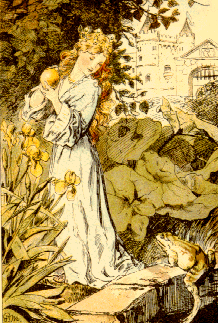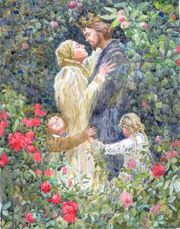Blog 5

Unfortunately, Snow White and the Seven Dwarves, the Disney adaptation of the Snow White fairy tale is very different from the original tale by the Grimm brothers. In the Grimm's fairy tales the princes never play a major role, they come in at the end and that's it. In Disney movies, the princes are always introduced pretty early and their characters are developed much more than in the original tales. In the Snow White movie, the prince is introduced very early and he even sings with Snow White. In the fairy tale, the prince comes in at the very end and he just happens to be in the forest where Snow White is lying in her coffin. Disney also developed the Dwarves characters much more than the Grimms did. In the movie, the dwarves all have names and those name correspond with their personalities. In the fairy tale, the dwarves aren't given names and they mostly save Snow White when her stepmother tries to kill her and they go to work. The dwarves in the fairy tale don't sing and dance and spend fifteen minutes learning how to clean themselves. One of the most major differences between the movie and the fairy tale is that the evil queen tries to kill Snow White not once, but three times. The queen tries to kill her by lacing her too tight, with a poisoned comb, and with a poisoned apple. The other major difference is that in the fairy tale the prince comes along and he thinks Snow White is so beautiful that he asks the dwarves if he can take her and her coffin home with him. When his servants are carrying the coffin they stumble and this causes the piece of apple to dislodge from Snow White's throat and she wakes up. In the movie, Snow White is awoken by the prince kissing her.

There are some similarities between the movie and the fairy tale, obviously, but there are definitely more differences. In both the movie and the tale, the queen commands a huntsman to take Snow White into the forest and kill her. The queen asks for the man to bring back organs as proof that Snow White is dead. However, the huntsman takes pity on Snow White and he allows her to escape and run away into the forest. In the fairy tale, the man brings back boar lungs and liver as proof and in the movie, the man brings back a pigs heart as proof. In both, the Dwarves warn Snow White not to talk to strangers and not to let anyone into the house. But the queen disguises herself as an old peddler and Snow White talks to her anyway. The movie only used one of the queen's methods for killing Snow White: the apple. And after she died the Dwarves in both the movie and the tale agreed that Snow White was too beautiful to be buried, so they made transparent coffins for Snow White.
Disney made changes to the storyline to make it more entertaining and to insert his beliefs into the movie. Disney took out the references to Christianity and added in songs and made the Dwarves into major characters. Snow White was made into the perfect housewife and she settled into her role very easily, until the prince came along to save her. Falling to your death is a gruesome way to die but Disney probably thought it was better than dancing in hot iron shoes until you drop dead. I think many of the changes were made because of the time period that the movie came out in.




















